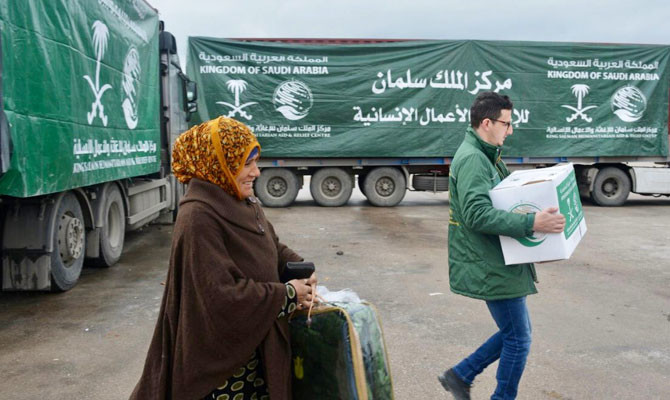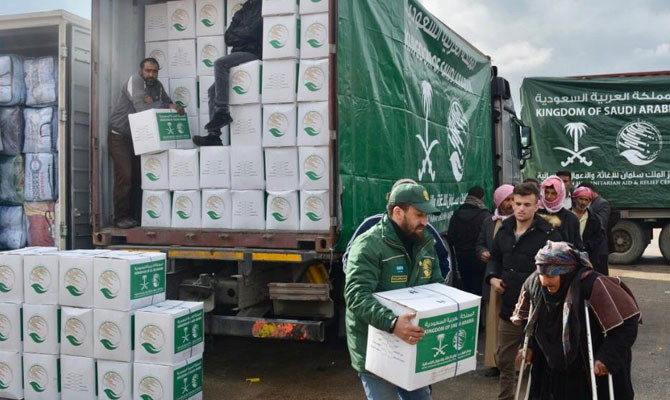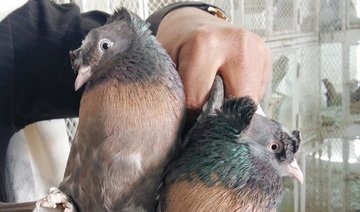JEDDAH: The King Salman Humanitarian Aid and Relief Center (KSRelief) helped 43 countries last year, a spokesman for the agency said Friday, as assistance to Yemen was stepped up.
Chalhoub bin Abdullah Chalhoub told a forum, titled “The intervention to alleviate the humanitarian crisis in the Muslim world,” in Cairo that the center provided assistance regardless of race, religion or nationality.
He said KSRelief sought to transfer its experience in relief and humanitarian work to Islamic countries and organizations.
Chalhoub said that the center’s assistance and promotion of humanitarian actions in Muslim countries come from a vision based on the Saudi pioneering role in relief and humanitarian action to convey Saudi values to the world.
In February alone the agency helped Syrian refugees in Jordan and Lebanon, Yemeni patients and internally displaced people in Nigeria.
Chalhoub was speaking on the sidelines of the first ever cultural and artistic festival organized by the Organization of Islamic Cooperation (OIC) titled “One nation and diverse cultures... Palestine in our heart.”
Other speakers at the symposium were KSRelief’s Dr. Yahya Al-Shammari, Hassan Abdel Moneim from the International Organization for Migration, Dr. Abeer Atifah of the World Food Programme and Osama Maher from the World Health Organization.
Delegates watched a documentary about Saudi relief and humanitarian efforts and the support provided to countries worldwide. There was also a presentation of statistics for countries benefiting from the Kingdom’s assistance.
As many as 2,501,897 Yemenis benefited from medical services provided by KSRelief in 2018, the Saudi Press Agency reported.
The aid was given on the directives of King Salman and Crown Prince Muhammed bin Salman.
The center is also actively involved in the rehabilitation of children affected by the war.
The program aims to help the children return to their normal lives, through teaching them and practicing different sports, as well as field trips. KSRelief plans to rehabilitate 2,000 children who were recruited by the Houthis.
A volunteer medical team from the agency has been performing open-heart surgeries and catheterizations in Yemen as part of a campaign ending Feb. 9. There have also been further deliveries of dialysis medication.
In the first six days of this campaign, the total number of operations conducted was 24 open-heart surgeries and 64 therapeutic catheterizations.
The father of one of the heart surgery patients brought his daughter from their home in Shabwa to Mukulla for treatment.
He said she had been suffering from heart issues for a long time but the family lacked the financial resources to get her the help she needed.
“We are so grateful for the generosity of KSRelief, which initiated this campaign, bringing hope to our family.”
Another parent also thanked the agency for its help, adding he had tried for eight years to find medical intervention for his son.
Saudi Arabia’s aid agency KSRelief at forefront of ‘global humanitarian effort’
Saudi Arabia’s aid agency KSRelief at forefront of ‘global humanitarian effort’

- Saudi Arabia’s relief agency extended help to 43 countries in 2018
- A volunteer medical team from the agency has been performing open-heart surgeries and catheterizations in Yemen as part of a campaign ending February 9
‘Lion King’ roars into life with Ithra live orchestra in Dhahran

- Family favorite is part of Ithra’s Disney in Concert series along with ‘Frozen’
DHAHRAN: Nearly three decades after it first captivated global audiences, Disney’s “The Lion King” dazzled new and older generations at the King Abdulaziz Center for World Culture, or Ithra, in Dhahran this week by offering a chance to watch the film anew with a live orchestra.
“We hope that it will bring goosebumps and tears,” conductor Erik Ochsner told the crowd before the show. “This is a live performance, and so we would beg of you to please just enjoy it live.”

As it has done in previous experiences, such as the 2019 and 2022 live orchestra showcases of several “Harry Potter” films in concert series, Ithra brought a full orchestra to perform Hans Zimmer’s Oscar-winning score while the animated film played in the background on a large screen.
For the experience, the film was stripped of the music while all the original audio, including dialogue and songs, remained untouched. The orchestra played those musical parts, breathing new life into the scenes without burying the essence of the nostalgic original.
HIGHLIGHTS
• Joining conductor Erik Ochsner was the Armenian State Symphony Orchestra, under the artistic direction of Sergey Smbatyan.
• For the experience, the Disney film was stripped of the music while all the original audio, including dialogue, remained untouched.
• ‘We hope that it will bring goosebumps and tears,’ Ochsner told the crowd before the show.
People clapped and sang along when the popular “Hakuna Matata” tune came on.
Originally released in 1994, “The Lion King” quickly became one of Disney’s most iconic films, celebrated for its powerful storytelling, memorable characters, and stirring soundtrack.

The animated film follows Simba, a young lion prince navigating the trials of loss, betrayal, and self-discovery on his journey to reclaim his rightful place in the animal kingdom.
At Ithra, this emotional arc was heightened by the rich, resonant sound of the live symphony orchestra, turning each moment— whether turbulent or triumphant— into an unforgettable experience.

Joining Ochsner was the Armenian State Symphony Orchestra, under the artistic direction of Sergey Smbatyan.
Known for their emotionally charged style and refined sound, the orchestra has built a reputation as a cultural ambassador of Armenia, regularly performing in major concert halls worldwide, including Ithra.
“The kids have seen the movie multiple times; we’ve all seen the movie multiple times. And we thought it would be nice to see it through a live orchestra,” audience member Ahmad Hassan told Arab News during the 20-minute intermission.
Hassan brought his extended family along, including his two children.
“It’s one of my favorite films,” Hassan’s nine-year old daughter Tia told Arab News. She gave the show a thumbs-up.
Her 12-year-old brother, Bakr, said he had watched the film “at least five times” — the first when he was about two or three — but was excited at this new way of appreciating the story.
“I like the show so far. It’s really good. Why? Because you get to see how the music is made instead of it just coming out of the speaker,” he said.
“After watching the show, I’d like to play the piano,” Tia added.
The concert is part of Ithra’s cinematic symphony series, which also includes an upcoming presentation of Disney’s “Frozen,” giving families the chance to relive favorite films in a whole new way.
Tickets are priced at SR200 ($53), and each of the Disney-Ithra performances will run for two days only.
Madinah’s summer harvest brings Abu Zuhair lemons to market

- The harvest, which runs from June to August, overlaps with the rhutab (semi-ripe dates) season and both fruits are sold in Madinah’s central market
MADINAH: The harvesting of Abu Zuhair green lemons, one of the main citrus fruits cultivated in Madinah, is now well underway.
The lemon trees grow throughout the province, especially in places like Abyar Al-Mashi, Abyar Ali, Asira and AlUla, where they thrive in the dry conditions and clay soil, the Saudi Press Agency reported.

The harvest, which runs from June to August, overlaps with the rhutab (semi-ripe dates) season and both fruits are sold in Madinah’s central market.
The lemons are sold in 2-25 kg batches at daily auctions that run from 5-11 a.m.
FASTFACTS
• The harvest of Abu Zuhair lemons, which runs from June to August, overlaps with the rhutab (semi-ripe dates) season.
• The lemons are sold in 2-25 kg batches at daily auctions in Madinah’s central market from 5-11 a.m
A vendor at the central market said Abu Zuhair lemons, which are smaller and greener than imported varieties, were ideal for juices and cooking, and paired well with many hot dishes and salads.
Toward the end of the harvest season, the lemons start to turn yellow and dry and are used for pickling.

Another vendor said the leaves of the lemon tree, known as nawami, could be added to tea and other cold beverages.
As well as commercial harvesting, many people grow Abu Zuhair lemons at home for their fragrance. The fruits are also a good source of vitamin C and support the immune system.
Most lemons grown in Madinah are sold locally though some are shipped to Makkah, Riyadh and Al-Ahsa. The small numbers produced mean they are never exported.
Registration opens for Bocuse d’Or, Pastry World Cup contests in Riyadh

- The initiative extends the partnership between the commission and Sirha Food, boosting competition in the national culinary sector and helping Saudi chefs make their mark internationally
RIYADH: Saudi Arabia’s Culinary Arts Commission has opened registration for the Bocuse d'Or championship and Pastry World Cup, both taking place during the Sirha Arabia exhibition in Riyadh in October.
The competitions will select top Saudi chefs to compete in the Middle East qualifiers, to be hosted by the Kingdom in 2026 in collaboration with Sirha Food. These in turn lead to the global finals which will take place in France at the Sirha Lyon exhibition in January 2027.
The initiative extends the partnership between the commission and Sirha Food, boosting competition in the national culinary sector and helping Saudi chefs make their mark internationally.
The competitions will discover and develop local talent, providing a platform for Saudi chefs to display their skills and highlight the diversity and creativity of the Kingdom’s cuisine.
Participants will undergo a process that includes technical tests, creativity evaluations and interviews. Finalists will receive tailored support to prepare for the international stage.
For Bocuse d’Or, dishes must exhibit mastery of either the turned vegetable or brunoise technique. Candidates must be Saudi, aged 23 or over and provide proof of identity.
For the Pastry World Cup, entries must creatively reflect the theme of “Elevating Saudi Dessert.” There is no age restriction, but non-Saudi applicants must state how long they have worked in the Kingdom.
Hopeful chefs can register at engage.moc.gov.sa/reg_forms/tracks/40/?lang=ar.
Mayor of Riyadh attends Rwanda national day celebration

- Saudi Arabia’s Ambassador to Pakistan Nawaf bin Saeed Al-Malki recently met Pakistani federal secretary of the Ministry of Interior and Drug Control, Mohammed Khurram Agha
RIYADH: Riyadh Mayor Prince Faisal bin Abdulaziz bin Ayyaf attended the National Day celebration held by the Embassy of Rwanda at the Cultural Palace in Riyadh, the Saudi Press Agency reported on Saturday.
The mayor was received by Rwandan Ambassador to the Kingdom Eugene Segore Kayihura and other officials.
Separately, Saudi Arabia’s Ambassador to Pakistan Nawaf bin Saeed Al-Malki recently met Pakistani federal secretary of the Ministry of Interior and Drug Control, Mohammed Khurram Agha. The pair discussed topics of common interest, the ambassador wrote on X.
Diriyah supports local creativity, national brands

- The initiative supports creative industries by connecting the public with local entrepreneurs and innovators, boosting the cultural economy and encouraging artistic and craft production
RIYADH: A daily event featuring Saudi brand stores and promoting local art, accessories and modern designs is taking place in Diriyah’s JAX District.
The event, which began on Wednesday and runs until July 8, is open from 8.30 p.m. until midnight and aims to support creativity and national products.

Brands taking part are presenting a range of innovative pieces that blend traditional craftsmanship with contemporary design, the Saudi Press Agency reported.
The initiative supports creative industries by connecting the public with local entrepreneurs and innovators, boosting the cultural economy and encouraging artistic and craft production.






















